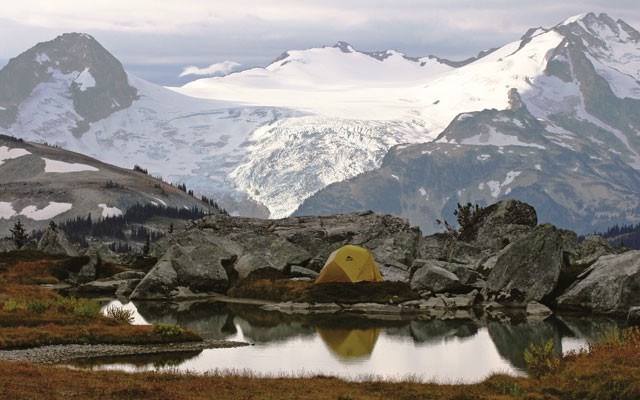Summer is often a time for reflection — when the hectic pace of the school and work cycle gives way to a more carefree take on life.
For Arthur DeJong, environmental resource manager and mountain planner with Whistler Blackcomb (WB), this summer has been one of assessment: How can Whistler Blackcomb improve upon its summer experiences?
The answer, he believes, lies in creating authentic, nature-based tourism experiences high in the Whistler alpine.
The ideas currently percolating inside his head include everything from creating greater connections between the trail systems of Whistler Blackcomb and Garibaldi Provincial Park to the installation of an iconic, eye-catching attraction high on the Whistler peaks — something along the lines of a suspension bridge or a restaurant or a natural science centre.
"We have this beautiful high alpine, how do we design the right feature attractions, iconic attractions to get more people up there?" DeJong said.
As mountain planner, it's a question he grapples with daily, and on a conceptual level, the possibilities are endless.
On a recent trip to France, DeJong took part in a mountain resort seminar with ski executives from across North America.
What was the takeaway?
"Great wine, great food," DeJong said.
But of course, the trip was about more than the culinary delights of French culture.
During his time in France, DeJong took in the sights and offerings of four different French ski resorts.
Upon his return, he had identified some key areas that WB could learn from the French.
"We have a youth culture here that drives a lot of what we do. We're inventive, and we should nurture that. We should never stop that, because we won't be leading edge without it, but we also have to think deeply about how we embrace all ages here," DeJong said.
"The French do a better job with the family experiences... they're very focused on that within the resorts."
The prevalence and affordability of family experiences is something Whistler Blackcomb will be looking into, DeJong said.
"The playgrounds are everywhere within the resorts. They will have playgrounds on mountaintops as well as the base areas," he said.
"I think it's essential... maybe we need to think of more value-added experiences that capture our youngest mountain users."
But it's not just children and families DeJong would like Whistler Blackcomb to cater to.
During the seminar, DeJong and the others were introduced to the Globe 3T mountain scooter — something he feels may be a good fit for Whistler.
"When you stand on it it's actually very stable, (with) the thickness of the tires and the footplates and the suspension. They were actually a lot of fun," he said, adding that the group had a chance to try out battery-operated mountain bikes as well.
"So if you've got your grandparents and you want to take them along the valley trail, you can get an energized bike and away you go," he said.
"I think it's a serious consideration. I think what we need to do is enhance the mobility of all of our different age groups. These bikes, particularly the motorized ones, are, I think, especially attractive to our mature potential user of the valley trail system, and they'll see more. I think that's the point."
And for those days when the weather isn't cooperating and the valley trail system isn't an option, DeJong found another lesson in the French's penchant for weatherproofing.
Some of the resorts the seminar visited had massive, indoor amenities that included enough activities to weather storms of any duration.
"That's definitely another sort of key point, is weatherizing our resort," he said, though he realizes the kind of capital costs that would come with such facilities.
But in an ideal tourism world, the weather is perfect and the visitors are flocking for an outdoor adventure they can call their own.
"When we look at tourism, global tourism is growing at close to five per cent annually, which in today's economy is good," DeJong said.
"The majority of people in this global tourism don't ski or snowboard, but they like to go to places where they can be in nature, recreate in nature. So you have this growth potential that is largely unrealized in mountain resort operations on the much larger global tourism market."
While DeJong's trip to France provided him with some very tangible, immediate takeaways, expanding summer-tourism in Whistler is never far from his mind.
He's done extensive research into the matter, and produced reports for WB that even touch on some of his more conceptual ideas — suspension bridges and all.
He likens his reports to a compass in constant need of readjustment.
"There's lots of check marks, but there's also lots of Xs. It's an evolving process that needs to be driven," he said.
"We have to be highly sensitized, so that, as we grow, we're quick to improve the weaknesses in the guest experience."
And as more visitors make their way to Whistler in the summer months, developers have to be aware of crowd density.
Crowded energy is a good thing for Whistler Village, less so for the areas further out.
"As you get out of the village, people have to be able to readily reconnect with experiences in nature," DeJong said.
"And so we have to be very mindful of, in these concentric circles as you build your way out, that they're finding that, and not being subjected to more of the urban experience which they had in the village."
While Whistler has come a long way in developing its summer experience in recent years, DeJong feels the surface has just barely been scratched.
"I think we're getting there, and particularly in developing nature-based tourism, but we have to grow it, refine it, keep driving it, keep investing in it. We've only really just begun here," he said.
"We can't rest on this for a moment. We need to take it to that next level, whatever that is."




